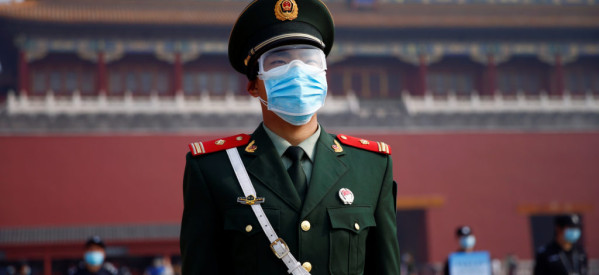The coronavirus has helped us finally see China for what it is


A Chinese paramilitary police officer wearing face mask and goggles stands guard outside the Forbidden City in Beijing on May 1. (Tingshu Wang/Reuters)
The novel coronavirus has helped us and our international partners to finally see the communist nation’s malign instincts. Though the virus originated in China, the government there denied U.S. officials access to essential health data or to reveal Patient Zero. It has yet to provide a live virus sample or allow outside investigators in. China also underplayed its infection and death rates, thus skewing data and handicapping researchers trying to solve the mystery of covid-19.
As with any unhealthy relationship, it’s worth considering our role in getting here. Ever since President Richard M. Nixon opened relations with China nearly 50 years ago, we’ve wanted engagement even at the expense of American values. We’ve not been demanding enough on human rights, starting with the 1989 Tiananmen Square massacre. We downgraded our relationship with our longtime friend, Taiwan, on the condition that the “Taiwan question” would be resolved peacefully to normalize relations with Beijing. And, we minded our own business during China’s one-child policy, which led to forced abortions and “30 million bachelors.”
Meanwhile, as co-dependents of a sort, we’ve happily allowed China to become an economic and military superpower while we fattened ourselves on cheap imports, washed down with the elixir of naive faith in the irresistible allure of democratic principles. Perhaps young nations such as ours shouldn’t presume to outmaneuver nearly 4,000-year-old cultures through flirtation and flattery.
By now, even President Trump’s critics may be willing to concede that he was right on this one. If he was elected partly to end China’s unfair trade practices, his reelection could depend on how successfully he navigates the China-Pandemic Problem.
There is little doubt that the Trump White House has been deploying anti-China rhetoric lately, seeking to blame China for the coronavirus as a key piece of its reelection strategy. It’s a fact, nevertheless, that China has a record of being the origin of viruses that are unleashed upon the rest of us, including H1N1 and SARS. As a strategic response, the Trump administration may be gearing up for a broader anti-China campaign in coming weeks and months.
But this new strategy doesn’t seem to be so much about the administration changing course; it is about changing how the rest of us regard the Middle Kingdom. A top administration official with whom I recently spoke said this attitudinal reset will require both a reeducation of the public, which sounds slightly Chinese-ish, as well as a mind-set shift at universities and corporations, many of which are deeply invested in China and, therefore, in the success of the Chinese Communist Party (CCP). Some universities, for example, are heavily dependent upon Chinese students who pay full tuition. Many schools don’t realize, the official said, that they’re helping China’s Communist Party.
At the same time, the Chinese government exerts outsize influence on U.S. financial institutions because of its control of capital flows throughout the world. In a speech last October before the Hudson Institute, Secretary of State Mike Pompeo mentioned conversations he has had with U.S. business leaders, who, heavily invested in China, were “forced to comply with China’s terms.”
In the Trump administration’s views, U.S. firms are being forced to choose between profits and human rights. House Speaker Nancy Pelosi (D-Calif.), who has steadfastly championed democracy and human rights in China since Tiananmen Square, understands this, the official suggested. “We can’t have different standards for them.”
The official suggested the United States would be taking other diplomatic steps soon to keep a closer eye on Beijing. I don’t doubt it. But I asked the official whether this supposedly new American resistance to China’s authoritarian methods might provoke an unwanted response.
The official cautioned that Washington did not want a confrontation with Beijing. He said this in a number of different ways: “We aren’t backing China against the wall. . . . We do not consider China an adversary but rather a competitor. . . . We prefer engagement. . . . It’s not about blame but about prudence.” He seemed to think the Chinese would match prudence with prudence, saying, “When China is challenged, it backs down immediately.”
Whether that is so, we’re likely to find out. But such thinking does remind one of exactly the sort of they’ll-think-like-us thinking that got us into trouble in the first place.
Source:https://www.washingtonpost.com/opinions/the-coronavirus-has-helped-us-finally-see-china-for-what-it-is/2020/05/08/27edeed0-9171-11ea-9e23-6914ee410a5f_story.html

